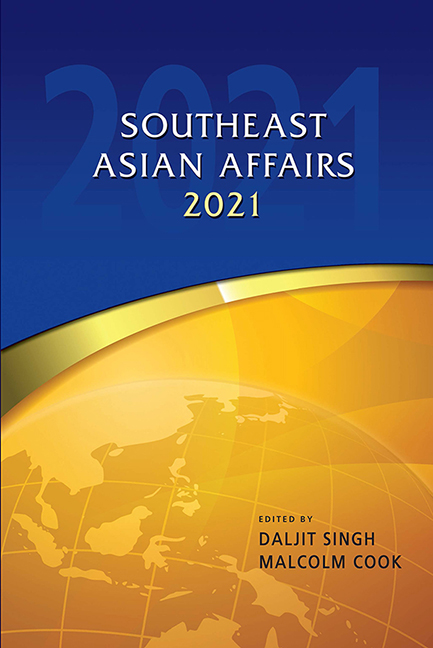The Philippines in 2020: Continuity despite Crisis
Published online by Cambridge University Press: 09 October 2021
Summary
The Philippines, in early 2020, became the first country in Southeast Asia to record a COVID-19-related death. A Chinese national visiting from Wuhan died on 1 February. The Philippines ended the year as the country in Southeast Asia the worst affected by this pandemic in combined public health and economic terms. It hammered the Philippine economy, with many predicting that the pandemic's global spread would turn the country's reliance on overseas remittances from a socio-economic buffer to a vulnerability.
The government's crisis response—highlighted by a particularly long and severe lockdown—exposed serious shortcomings in policy planning and implementation by the national government; very credible allegations of corrosive corruption in key government agencies; and President Duterte's ineffective crisis leadership. Many have argued that President Duterte's rhetorical focus on fighting corruption, delivering public services, and the poor is a key factor in his enduring popularity. In 2020, the president and his administration fell short of this rhetoric in practice.
Despite the depth and duration of the ongoing COVID-19 crisis and the ineffective government response, however, Philippine domestic politics and foreign policy have gone largely undisrupted. President Duterte remains very popular and is in a uniquely powerful position among post-Marcos presidents entering the final quarter of their respective single six-year terms. Philippine foreign policy remains in volatile tension between the president's personal embrace of China and President Xi Jinping and his animus towards America and the bureaucratic state and the Philippine population's opposing preferences. Fortunately, despite predictions of doom, overseas remittances continue to act as an economic buffer, and indeed a more important one, given the steep and sustained fall-off in trade and private capital formation in 2020.
This overview chapter begins by looking at the public health and economic impacts of the COVID-19 pandemic on the Philippines. It then looks at how both of these were aggravated by the shortcomings of the national government's crisis response. The next two sections look at how domestic politics and foreign policy remained largely undisrupted. The conclusion offers some predictions for 2021.
The Philippines’ Pandemic
As is clearly shown by the Philippine Department of Health's COVID-19 Tracker website, from March 2020 until the end of the year, the Philippines experienced one continuous wave of recorded COVID-19 cases that crested at a high of 22,813 new recorded cases in the second week of August.
- Type
- Chapter
- Information
- Southeast Asian Affairs 2021 , pp. 237 - 256Publisher: ISEAS–Yusof Ishak InstitutePrint publication year: 2021

